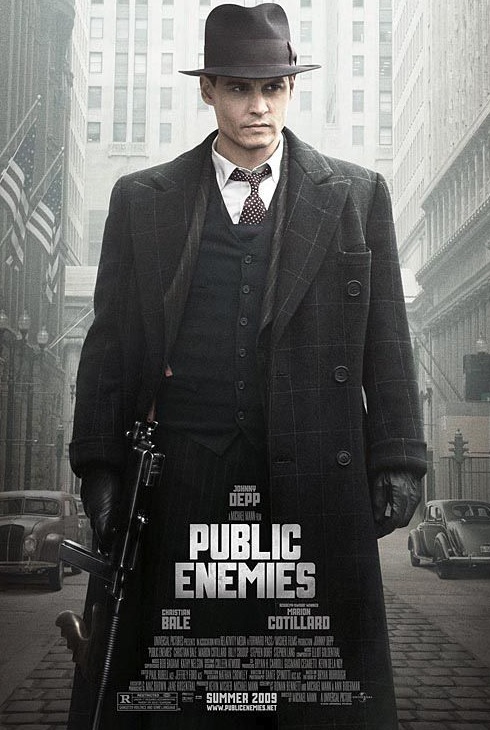
Sneaking beer into a midnight premiere of a movie: a little crazy.
Sneaking beer bottles into a midnight premiere of a movie: definitely crazy.
Sneaking beer bottles into the midnight premiere of Public Enemies: straight gangster.
And apparently the quartet of little 16-year-olds sitting down the aisle from me are more hardcore than I am, because the four of them somehow managed to sneak in more than six bottles, which they downed before the previews were done and spent the remaining time kicking over the empties and squeezing past me to get to the bathroom. Between the booze to my left and the four homeboys to my right who apparently bathed in Axe body spray before they left the house, I couldn't even taste my popcorn by the end of the movie.
But there was a movie going on, despite the repeated bathroom breaks the drunkies to my left needed to take. And it was a pretty good movie...but not quite as good as it could have been.
The movie Public Enemies tells the story of 1930s bank robber John Dillinger. This guy was more notorious than Al Capone, but somehow came out on the other side drawing comparisons to Robin Hood. He was a suave, good-looking (relatively; a quick Google image search shows you what suave and good-looking meant in 1933), charming man who did what we all wish we could do when The Man gets us down -- he did whatever he wanted.
The real-life story of Dillinger is fantastic and compelling; the man broke his associates out of prison in Indiana, stole more than $300,000 (which is over $4 million by today's standards) in less than a year of bank robbing, attacked two state police arsenals to stock up on weapons and ammo, traveled to Florida, Texas and Arizona to stay hidden from the authorities, was arrested after a fire broke out in his hotel and he was found with stolen money and guns, escaped custody in Arizona by stealing the sheriff's car, and became the number one most wanted criminal on the FBIs list.
Public Enemies does a good job of telling the story, but I kept waiting for the movie to choose the genre path it would take. When a movie comes out about a subject like this, it usually goes in one of two directions: it can either be an action movie with lots of gunfights, snappy one-liners and a larger-than-life feel (like Goodfellas or Pulp Fiction), or it can be a dramatic movie that focuses on the details of the story, the development of the character's thoughts, emotions and relationships, and seeks to connect the audience to the main character in some way (Road To Perdition, Scarface, etc).
This movie kind of half did both things. There was good action, but it wasn't sustained enough. They showed a few of the bank robberies, including a scene with Dillinger's trademark vault over the bank teller's counter, but then another quiet, dramatic scene came in on its heels. I was waiting for one of those action-movie montages, where they would show one robbery after another with the captions of the date and place underneath and a loud soundtrack that gets you pumped up about what's happening on screen. None of these things happened, and even the music was mostly disappointing, other than one main theme featuring a distorted guitar and a banjo that they should have played a lot more. They didn't even show Dillinger's most famous robbery, in which he and his gang pretended to be filming a bank robbery scene for a movie, which drew applause from the customers and bank employees. There are some good one-liners, including my favorite from Dillinger: "Good thing he was pretty, because he sure ain't called Whiz Kid Floyd."
But on the the other side, I felt like they didn't spend enough time developing Dillinger's relationship with Billie Frechette (played by Marion Cotillard, who gets strangely more and more attractive as the movie goes on). They meet, Dillinger pursues as only Dillinger can, and they end up together. I suppose it was one of those whirlwind encounters that happen every now and then in life, but by the end, the two are so powerfully and resolutely devoted to each other that it left me wondering how they got to that point. The same happens with Dillinger's best friend and number two man, John "Red" Hamilton. To emphasize what I mean, I had to look up that character's name on IMDB.com to figure out who he was. He was Dillinger's right-hand man, and there's a scene where the two of them share what appears to be a deep connection, but the movie doesn't really develop this or show how it came to be.
Overall, I enjoyed the movie, because I enjoy almost every movie I see. It's a good story with some good action and some good genuine moments. But it turned out to be a tad disappointing because of how good it could have been.
As we were walking out, I could tell that the gangsta-wannabe kids were disappointed. They wanted to see Johnny Depp busting caps and rolling with shorties in his pimped-out gangsta ride...but instead they just saw a bunch of white guys in gray wool suits driving old Fords through the midwest. Not that we're stereotyping or anything. It's OK, they were Mexican. We're allowed to make fun of them, right?
No comments:
Post a Comment